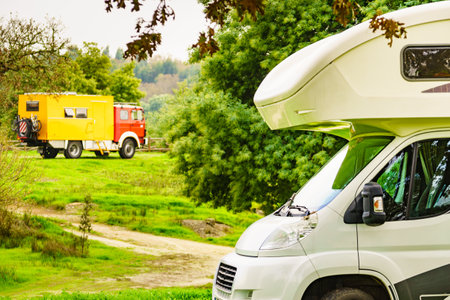Understanding Motorhome Hookups in the UK
When setting off on a family motorhome adventure across the UK, one of the first things you’ll encounter at most campsites is the electrical hookup point. In simple terms, a motorhome hookup is a dedicated connection that allows you to plug your vehicle into the site’s electricity supply, powering everything from your kettle for a morning cuppa to your heater on a chilly night. These hookups are specially designed for outdoor use and provide a safe way to enjoy modern comforts while exploring the great British countryside. Most campsites in the UK offer 16-amp or sometimes 10-amp outlets, giving you plenty of juice for daily essentials. But here’s where it gets important: using these hookups safely isn’t just about convenience—it’s essential for protecting your family and your motorhome from electrical hazards. Whether you’re new to camping or a seasoned explorer, understanding how hookups work and why safety matters is key to making every trip enjoyable and worry-free.
2. UK Regulations for Motorhome Electrical Connections
When it comes to motorhome hookup safety in the UK, understanding the regulatory landscape is essential for both parents and their little adventurers. The UK places a strong emphasis on electrical safety, ensuring that every family’s journey is not only memorable but also secure from the moment you plug in at a campsite.
The British Standards Institution (BSI) sets out key requirements for motorhome electrical connections. The main standard you’ll encounter is BS 7671, commonly known as the IET Wiring Regulations. This standard outlines how electrical installations, including those on campsites and within your motorhome, should be designed, installed, and maintained. Compliance with BS 7671 helps keep everyone safe from electrical hazards—giving mums, dads, and children peace of mind while enjoying their travels.
Most UK campsites have their own set of rules based on these national standards. They require all electric hook-up points to meet strict criteria for safety and reliability. Campsite owners regularly inspect and test electrical outlets to make sure they’re up to scratch. For visiting families, this means you can expect consistent safety measures wherever you choose to stay.
| Requirement | Description | Relevant Standard/Regulation |
|---|---|---|
| Electrical Installation Condition Report (EICR) | Regular inspection of fixed wiring at campsites | BS 7671 |
| Residual Current Devices (RCDs) | Mandatory use to protect against electric shock | BS 7671 & HSE Guidance |
| Cable Quality and Connectors | Cables must be weatherproof and connectors must be compatible with UK hook-up sockets | BS EN 60309-2 |
| User Awareness | Campsites must provide clear guidance for safe connection and disconnection procedures | Campsite Policy/Local Authority Guidance |
It’s also worth noting that some campsites may require proof of recent Portable Appliance Testing (PAT) or evidence that your motorhome’s electrics have been checked by a qualified electrician. So before setting off with your family, double-check your paperwork and ensure everything is up-to-date—because nothing says ‘relaxing holiday’ like knowing you’re fully prepared!
![]()
3. LOLER Testing and Its Importance
If you’ve ever heard fellow motorhome enthusiasts chat about “LOLER testing,” you might wonder what it’s all about. Let’s break it down together in a friendly, easy-to-understand way. LOLER stands for the Lifting Operations and Lifting Equipment Regulations, a key piece of UK safety legislation that helps keep everyone safe when using lifting equipment—including certain parts of your motorhome hookup system.
What Is LOLER Testing?
LOLER testing is a legal requirement in the UK for any equipment that’s used for lifting or lowering loads, including winches, hoists, and some stabilising jacks often found on motorhomes. The test checks to make sure this equipment is strong, stable, and working as it should. Even if you’re just heading off on holiday with the family, these checks help prevent accidents and give you peace of mind at every campsite.
Why Does It Matter for Motorhome Hookups?
You might ask: “Isn’t LOLER just for building sites?” Actually, if your motorhome has mechanical parts that lift or support weight—like electric levelling systems—it may fall under these rules too. Faulty lifting gear can cause injury or damage to your beloved home-on-wheels. Regular LOLER inspections mean problems are spotted early, keeping everyone—kids, grandparents, even furry friends—safe and sound.
How Does LOLER Keep Us Safe?
Think of LOLER testing as a routine health check for your motorhome’s vital bits. Qualified inspectors look for wear, corrosion, or faulty parts before they become real hazards. When your equipment passes its LOLER test, you get a certificate showing everything is up to scratch—so you can relax and focus on making happy memories, not worrying about unexpected mishaps.
By understanding and following LOLER requirements, you’re not just ticking a box; you’re looking after yourself, your loved ones, and everyone sharing the campsite with you. Now that’s the kind of British road trip spirit we all love!
4. Common Safety Risks and How to Avoid Them
When enjoying the great British outdoors in your motorhome, it’s vital to be aware of common electrical safety risks at hook-up points. Here are some practical scenarios you might encounter, along with simple and reassuring steps to help you spot and prevent danger—keeping your family adventures safe and sound.
Practical Scenarios of Electrical Hazards
| Scenario | Potential Hazard | How to Spot It | Reassuring Prevention Tips |
|---|---|---|---|
| Loose or Exposed Wires | Electric shock or fire risk | Wires not fully covered, visible copper strands, or frayed insulation near the plug or socket | Always inspect cables before connecting. If you spot damage, use a different hook-up point and report it to site staff immediately. |
| Damp or Wet Hook-Up Points | Short circuits and electrocution | Puddles around the base, condensation inside plastic covers, or recent heavy rain | Avoid using any hook-up that appears wet. Wait until conditions are dry, and never touch electrics with wet hands. |
| Poorly Maintained Sockets | Sparks, overheating or inconsistent power supply | Sockets that look burnt, cracked, or emit a burning smell when in use | Select another hook-up if possible. Always alert campsite management so they can arrange repairs. |
| Incorrect Cable Use (e.g., wrong length or type) | Cable overheating or tripping hazards | Cables stretched taut across walkways or using domestic extension leads instead of proper outdoor-rated ones | Use only certified outdoor motorhome hook-up cables of appropriate length—never join multiple cables together. |
| Overloading Circuits with Too Many Devices | Circuit breaker trips or cable overheating | Hook-up trips frequently or sockets feel warm after plugging in several appliances | Stick to one high-wattage appliance at a time (like kettles or heaters). Spread out device usage and check your site’s amp limit before plugging in. |
Family-Friendly Tips for Motorhome Safety Checks
- Create a simple checklist: Before every trip, go through a quick visual inspection together with your children—make it a fun routine!
- Teach “look but don’t touch”: Encourage kids to spot potential dangers but remind them never to touch electrical connections themselves.
- Keep equipment tidy: Store cables off the ground and away from play areas to prevent tripping and accidental damage.
- Report issues promptly: If you notice anything odd at a hook-up point, let someone responsible know right away. Better safe than sorry!
Together on the Safe Side!
Your family’s comfort and security come first. By staying alert to these common risks and following these down-to-earth tips, you’ll make every UK motorhome adventure not just memorable but reassuringly safe for everyone involved.
5. Best Practices for a Safe and Enjoyable Experience
When you’re setting up your motorhome at a UK campsite, safety should always come first—especially when it comes to using Electric Hook-Up (EHU). By following some simple, family-friendly steps, you can make sure everyone has a secure and fun holiday.
Check Your Equipment Before Every Trip
Before you leave home, take time to inspect your cables, plugs, and sockets for any signs of wear or damage. Frayed wires or cracked plugs are a no-go; it’s much better to replace them than risk an accident. Make sure your EHU cable is long enough for most pitches but isn’t so long that it becomes a trip hazard.
Setting Up Safely on Site
Once you arrive, always uncoil your cable fully before plugging in. Coiled cables can overheat—think of it like wrapping yourself in a big jumper on a sunny day! Plug into the site’s EHU post first, then connect to your motorhome. This way, if there’s any issue with the power supply, you’re not left holding a live cable. If you have children, show them where the cables are laid so they know to step over them safely.
Keep Cables Dry and Secure
Make sure connections are off the ground and protected from water—British weather is famously unpredictable! Use purpose-made cable covers if your cable crosses footpaths and keep excess cable neatly coiled by the side of your van.
Regular Checks During Your Stay
It’s good practice to check your setup each day. Look out for loose connections or signs of overheating such as melting or scorch marks. If you notice anything unusual, switch off and ask for help right away.
The Helpful Role of Campsite Staff
If you’re ever unsure about how to use the EHU safely, don’t hesitate to ask the campsite staff. They’re there to help and will have lots of experience in spotting potential hazards. Some sites even carry out regular LOLER checks on their equipment, giving families extra peace of mind.
A Team Effort for Family Safety
By involving everyone—from grown-ups to little adventurers—in checking and respecting the hookup rules, you help create a safe space for play and relaxation. Remember: safety isn’t just about ticking boxes; it’s about making happy memories together!
6. What to Do in an Emergency
Even with the best safety practices, unexpected situations can occur when using a motorhome hookup. Staying calm and knowing what steps to take can help keep your family safe. Here’s a clear guide for parents and families on handling emergencies related to your motorhome’s electrical hookup.
Stay Calm and Assess the Situation
If you notice a burning smell, see sparks, or experience a sudden loss of power, immediately switch off the hookup at the source if it’s safe to do so. Keep children away from the area and reassure them that you are handling things.
Evacuate If Necessary
If there is smoke, fire, or obvious danger, calmly gather everyone and move away from the motorhome and hookup point. Head to a designated assembly area or a safe distance as advised by campsite staff.
Contact Emergency Services
In the UK, dial 999 for emergencies (fire, police, or ambulance). Be ready to provide your location — most campsites will have their postcode and emergency instructions displayed near reception. Let them know you’re in a motorhome and describe the issue clearly.
Inform Campsite Staff
Alert campsite staff immediately after contacting emergency services. They are trained to respond quickly and may have additional equipment or procedures in place to support you and other guests.
Do Not Attempt Repairs Yourself
Never try to fix electrical problems on your own unless you are qualified. Wait for professional help to arrive. Unqualified repairs could put your family at further risk.
After the Incident
Once everyone is safe and the immediate danger has passed, follow up with your insurance provider if necessary and arrange for a qualified electrician to inspect your motorhome’s electrical system before reconnecting.
Reassure Your Family
It’s natural for children (and adults!) to feel shaken after an emergency. Talk about what happened, answer questions honestly, and remind everyone that following safety procedures helped keep everyone safe.
By understanding these steps and sharing them with your family before setting off on your UK adventures, you’ll be better prepared for any unexpected events while enjoying your time together on the road.
7. Resources and Further Reading for Families
If you’re keen to dig deeper into motorhome hookup safety in the UK, there’s a wealth of trusted information out there to guide you and your family. Whether you’re seasoned travellers or just starting your adventures, having reliable advice at your fingertips helps everyone feel safe and confident on the road.
A Warm Welcome to Trusted Sources
For families new to the world of motorhomes, the following organisations offer clear, friendly guidance on all aspects of hookup safety:
The Camping and Caravanning Club
This long-established club provides a brilliant library of resources on electrical safety, site etiquette, and best practices for families exploring the UK by motorhome. Their guides are written with families in mind and often address common concerns parents may have.
Caravan and Motorhome Club
Another excellent starting point, this club offers practical checklists, downloadable guides, and access to community forums where parents can ask questions and share experiences about safe hookups and equipment maintenance.
Electrical Safety First
This independent charity is dedicated to reducing electrical accidents in homes and leisure vehicles across the UK. Their website features up-to-date advice on safe electrical connections, including specific sections for caravans and motorhomes.
Official Regulations and Testing Information
For those wanting to learn more about the legal side of things, the Health and Safety Executive (HSE) is the go-to source for official LOLER testing requirements and regulations regarding portable electrical systems. Their easy-to-understand guides make complex rules feel less daunting for families.
Ongoing Support for Parents
If you’re ever unsure about a hookup point, testing schedule, or need a refresher on best practices, many local campsites provide onsite safety leaflets or can recommend qualified electricians familiar with motorhome standards. Don’t hesitate to reach out—there’s always someone happy to help you keep your adventures safe and sound!
Staying Connected as You Travel
As your family journeys across the UK, remember that learning together is part of the fun. Bookmark these resources, join online forums or social media groups specific to motorhome travel with children, and encourage everyone in your crew to get involved in safety checks. After all, peace of mind is one of the best souvenirs you can collect along the way!


